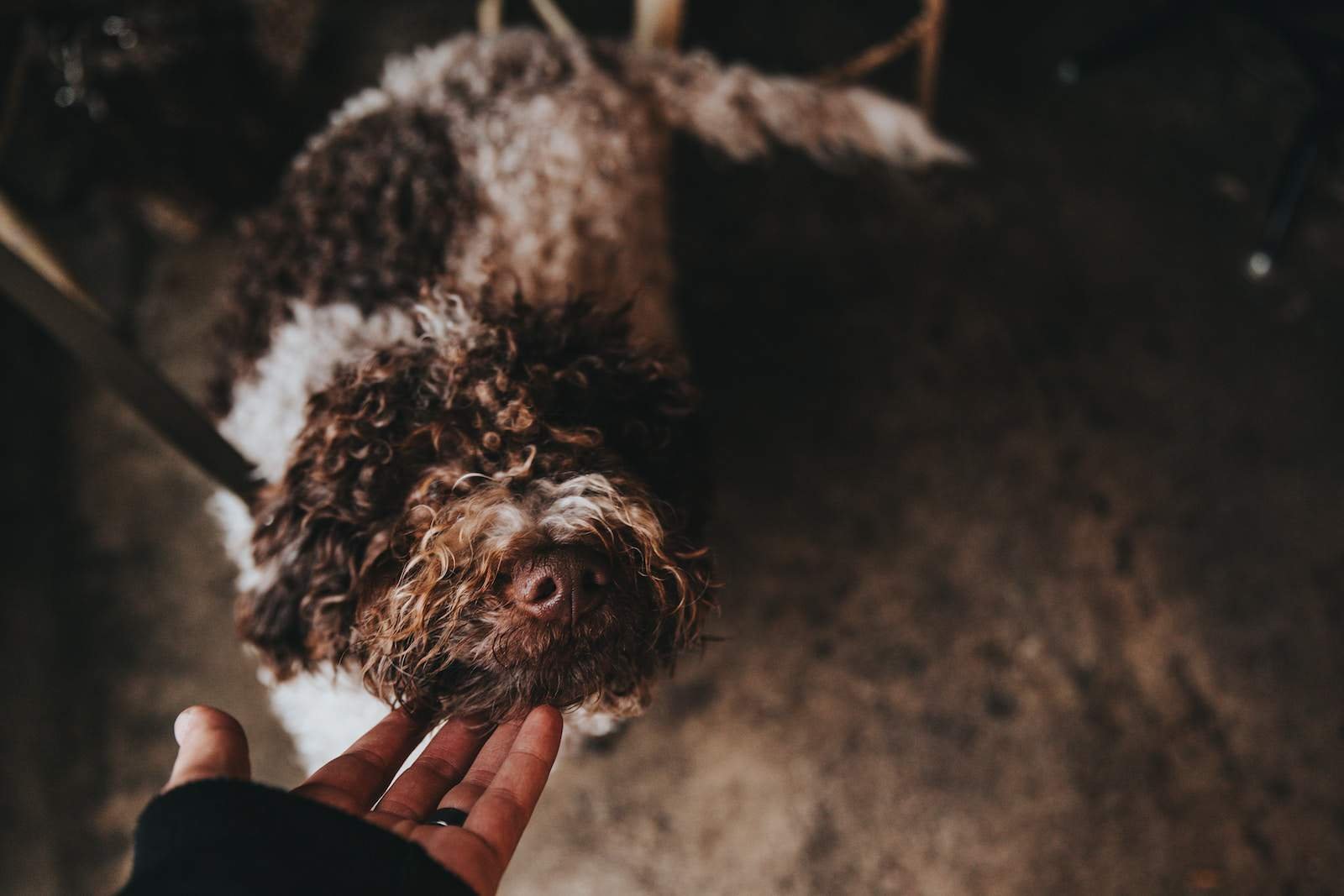Newfoundland Poodles, also known as Newfypoos, are a crossbreed between a Newfoundland and a Standard Poodle. This designer dog breed has been gaining popularity in recent years due to their unique characteristics and friendly personalities. As a mixed breed, they inherit traits from both parent breeds, resulting in a gentle giant that is both intelligent and loyal.
The history and origin of the Newfoundland Poodle mix is not well-documented, but it is believed that they first emerged in the United States in the 1980s. The American Kennel Club does not recognize them as an official breed, but they are recognized by other organizations such as the Designer Breed Registry and the International Designer Canine Registry. Despite their mixed heritage, Newfypoos have become a sought-after companion for families and individuals alike.
Key Takeaways
- Newfoundland Poodles are a crossbreed between a Newfoundland and a Standard Poodle.
- They are a mixed breed that inherit traits from both parent breeds, resulting in a gentle giant that is both intelligent and loyal.
- Despite not being recognized by the American Kennel Club, Newfypoos have become a popular companion for families and individuals alike.
History and Origin
The Newfoundland Poodle, also known as the Newfypoo, is a hybrid dog breed that originated in North America. This breed is a cross between the Newfoundland and the Poodle, two purebred dogs with rich histories. The Newfoundland, also known as the Newfie, is a large working dog that originated in Newfoundland, Canada. The breed was originally used for fishing and hauling nets, as well as for water rescue. The Poodle, on the other hand, is a smaller dog that originated in Germany and France. The breed was originally bred for hunting and retrieving waterfowl.
The exact history and origin of the Newfoundland Poodle breed is not well-documented. However, it is believed that the breed was first developed in the 1980s or 1990s, when breeders began crossing Newfoundlands with Poodles to create a hypoallergenic, intelligent, and affectionate family dog. The breed quickly gained popularity in North America and has since become a beloved companion for many families.
Despite being a relatively new breed, the Newfoundland Poodle has already made a name for itself in the dog world. The breed is known for its intelligence, loyalty, and affectionate nature, as well as its hypoallergenic coat. The breed is also highly trainable and excels in obedience and agility competitions.
In summary, the Newfoundland Poodle is a hybrid dog breed that originated in North America. The breed is a cross between the Newfoundland and the Poodle, two purebred dogs with rich histories. While the exact history and origin of the breed is not well-documented, it is believed that the breed was first developed in the 1980s or 1990s. Despite being a relatively new breed, the Newfoundland Poodle has quickly gained popularity and is known for its intelligence, loyalty, and affectionate nature.
Characteristics
Newfoundland Poodles, also known as Newfypoos, are a crossbreed between the Newfoundland and Poodle breeds. They are a relatively new breed, and their characteristics can vary depending on their parents’ traits.
Size and Weight
Newfoundland Poodles are a large breed, with males typically measuring between 28 and 30 inches in height and weighing between 100 and 150 pounds. Females are slightly smaller, measuring between 26 and 28 inches in height and weighing between 80 and 120 pounds.
Coat and Colors
Newfoundland Poodles have a thick, curly coat that is typically hypoallergenic, making them an excellent choice for those with allergies. Their coat can come in a variety of colors, including black, brown, white, cream, and gray.
Body and Tail
Newfoundland Poodles have a muscular build, with a broad chest and strong legs. They have a wide, flat head with a long snout and floppy ears. Their tail is typically long and curly, and they have webbed feet, which make them excellent swimmers.
Overall, Newfoundland Poodles are a friendly, intelligent, and loyal breed that makes an excellent family pet. They are great with children and other pets and are known for their playful and affectionate nature. If you are considering adding a Newfoundland Poodle to your family, be prepared for a large, loving, and energetic companion.
Temperament and Personality
When it comes to the Newfoundland Poodle, their temperament and personality are some of their most endearing qualities. This breed is known for being gentle, loyal, and friendly, making them an excellent companion for families and individuals alike. They are also highly protective of their loved ones, making them great watchdogs.
Newfoundland Poodles are energetic and intelligent dogs that love to be around people. They are patient and affectionate, making them great with children. They have a calm and even-tempered personality, which makes them easy to train and eager to please.
As a working dog, the Newfoundland Poodle is highly intelligent and trainable. They are confident and eager to please, which makes them excellent at tasks such as search and rescue, therapy work, and obedience training. Their intelligence also means that they need plenty of mental stimulation to stay happy and healthy.
Overall, the Newfoundland Poodle is a smart, affectionate, and even-tempered breed that makes an excellent companion for families and individuals alike. Their loyalty and protectiveness make them great watchdogs, while their intelligence and eagerness to please make them excellent working dogs.
Health and Lifespan
Newfoundland Poodles, also known as Newfypoos, are a hybrid breed that combines the intelligence and hypoallergenic qualities of Poodles with the size and strength of Newfoundland dogs. When it comes to their health and lifespan, there are a few key things to keep in mind.
Common Health Issues
Like all breeds, Newfypoos are prone to certain health issues. One of the most common is hip dysplasia, a condition where the hip joint doesn’t develop properly and can lead to arthritis and mobility issues. Other potential health concerns include subvalvular aortic stenosis, which is a heart condition, and progressive retinal atrophy, which can lead to blindness. Cherry eye, a condition where the gland in the dog’s eyelid becomes inflamed and protrudes, is another issue to watch out for.
Life Expectancy
The lifespan of a Newfypoo can vary depending on several factors, including their size and overall health. On average, they can live anywhere from 8 to 12 years, although some may live longer. It’s important to note that larger dogs tend to have shorter lifespans than smaller breeds.
To ensure your Newfypoo lives a long and healthy life, it’s important to prioritize their health and well-being. Regular vet checkups, a balanced diet, and plenty of exercise can all help keep your dog healthy and happy. Additionally, be sure to keep an eye out for any potential health issues and address them promptly if they arise.
Grooming Needs
Proper grooming is essential for maintaining the health and appearance of your Newfoundland Poodle. Regular grooming can help prevent matting, skin irritation, and other issues. Here are some grooming needs you should be aware of:
Bathing and Brushing
Newfoundland Poodles should be bathed every 4-6 weeks. Use a dog-specific shampoo and conditioner to avoid drying out their skin. Brushing should be done at least once a week to prevent matting and tangling. Use a slicker brush to remove loose hair and a comb to detangle any knots.
Ear Care
Newfoundland Poodles have floppy ears that can trap moisture and wax, leading to ear infections. Check their ears regularly for redness, swelling, or odor. Clean their ears with a cotton ball and ear cleaner made specifically for dogs. Avoid using cotton swabs, as they can damage the ear canal.
Nail Care
Regular nail trimming is important for your Newfoundland Poodle’s comfort and health. Long nails can cause discomfort when walking and can even lead to joint problems. Trim their nails every 4-6 weeks, or as needed. Use a dog-specific nail clipper and be careful not to cut the quick, which is the pink part of the nail that contains blood vessels and nerves.
Overall, grooming your Newfoundland Poodle is an important part of keeping them healthy and happy. By following these grooming needs, you can help prevent common issues and keep your dog looking and feeling their best.
Training and Exercise
Newfoundland Poodles are intelligent and energetic dogs that require proper training and exercise to thrive. It is important to understand their trainability and mental stimulation needs to ensure they are well-behaved and socialized.
Training Techniques
Newfoundland Poodles are highly trainable, and positive reinforcement techniques are recommended for their training. These techniques involve rewarding good behavior with treats, praise, or playtime. Punishment or negative reinforcement should be avoided as it can harm the dog’s mental well-being and damage the dog-owner relationship.
Socialization is crucial for Newfoundland Poodles during their training. They should be exposed to different people, animals, and environments at an early age to prevent fear or aggression issues. Consistency and patience are also essential during the training process.
Exercise Needs
Newfoundland Poodles are energetic dogs that require daily exercise to release their energy. They enjoy activities such as swimming, running, and playing fetch. A lack of exercise can lead to behavioral problems such as anxiety, boredom, and destructive behavior.
Owners should provide mental stimulation for Newfoundland Poodles to keep them entertained and prevent boredom. Toys such as puzzle feeders or interactive toys can provide mental stimulation and keep their minds active.
It is important to note that Newfoundland Poodles have different exercise needs depending on their age, health, and energy level. Owners should consult with their veterinarian to create an exercise plan that is suitable for their dog’s needs.
In conclusion, proper training and exercise are essential for Newfoundland Poodles to live a happy and healthy life. Positive reinforcement techniques and socialization are recommended for their training, while daily exercise and mental stimulation are necessary to release their energy and prevent behavioral problems.
Diet and Nutrition
Proper nutrition is crucial for the health and well-being of all dogs, including the Newfoundland Poodle. Feeding your dog a balanced diet that meets their nutritional needs is essential for maintaining optimal health. A healthy diet can help prevent a variety of health problems, including obesity, diabetes, and joint problems.
When it comes to feeding your Newfoundland Poodle, it is important to choose a high-quality dog food that is specifically formulated for their size, age, and activity level. Look for dog foods that are made with high-quality ingredients, such as real meat, whole grains, and vegetables. Avoid dog foods that contain fillers, artificial preservatives, and by-products.
In addition to choosing the right dog food, it is also important to feed your Newfoundland Poodle the right amount. Overfeeding can lead to obesity, which can increase the risk of other health problems. Follow the feeding guidelines on the dog food label, and adjust the amount you feed based on your dog’s activity level and body condition.
It is also important to provide your Newfoundland Poodle with fresh, clean water at all times. Dehydration can lead to a variety of health problems, including kidney disease and urinary tract infections. Make sure your dog has access to fresh water at all times, and clean their water bowl regularly to prevent the growth of bacteria.
Overall, feeding your Newfoundland Poodle a healthy, balanced diet is essential for their health and well-being. By choosing the right dog food and feeding the right amount, you can help prevent a variety of health problems and ensure that your dog stays healthy and happy for years to come.
Adoption and Price
Adopting a Newfoundland Poodle can be a rewarding experience for anyone looking for a loyal, intelligent, and friendly companion. However, it’s important to understand the adoption process and the price range associated with it.
Adoption Process
If you’re interested in adopting a Newfoundland Poodle, there are several options available. You can either buy a puppy from a breeder or adopt one from a rescue organization.
When adopting a Newfoundland Poodle puppy, it’s important to ensure that the breeder is reputable and follows ethical breeding practices. You can check with the American Kennel Club (AKC) to find a list of registered breeders in your area.
On the other hand, adopting a Newfoundland Poodle from a rescue organization can be a more affordable option. Rescue organizations are dedicated to finding loving homes for abandoned or surrendered dogs. You can check with local animal shelters or search online for rescue organizations that specialize in Newfoundland Poodles.
Price Range
The price of a Newfoundland Poodle puppy can vary depending on several factors, including the breeder, location, and bloodline. On average, the price range for a Newfoundland Poodle puppy can be anywhere from $1,000 to $3,000.
Adopting a Newfoundland Poodle from a rescue organization can be more affordable, with adoption fees typically ranging from $200 to $500. However, it’s important to note that rescue organizations may require additional fees for vaccinations, spaying or neutering, and other medical expenses.
In conclusion, adopting a Newfoundland Poodle can be a fulfilling experience, but it’s important to understand the adoption process and the associated costs. Whether you choose to buy a puppy from a breeder or adopt one from a rescue organization, make sure to do your research and choose a reputable source.
Living Conditions
Newfoundland Poodles are adaptable and can adjust to different living conditions, but there are some factors to consider when providing them with a suitable environment.
Living with Kids and Other Pets
Newfoundland Poodles are generally good with kids and other pets, but early socialization is important. This breed is known for its gentle and friendly nature, which makes them great companions for families with children and other pets. However, it’s important to supervise interactions between kids and dogs to prevent any accidents. It’s also important to teach children how to properly interact with dogs and respect their boundaries.
Space Requirements
Newfoundland Poodles are medium to large-sized dogs, and they require a decent amount of space to move around comfortably. They are not ideal for apartment living, but they can adapt to smaller living spaces if given enough exercise and mental stimulation. A larger home with a yard is ideal for this breed, as they enjoy spending time outdoors and need plenty of room to run and play.
When it comes to living conditions, Newfoundland Poodles thrive in a home with a loving and attentive family. They are social dogs and enjoy being around their owners. It’s important to provide them with plenty of exercise, mental stimulation, and socialization to keep them happy and healthy. With the right care and attention, Newfoundland Poodles can make wonderful companions for families with kids and other pets.
Special Considerations
Newfoundland Poodles are a unique breed that requires special considerations due to their distinctive traits. In this section, we will explore the service and therapy potential, swimming affinity, and allergy considerations of this breed.
Service and Therapy Potential
Newfoundland Poodles have a great potential for service and therapy work due to their gentle and intelligent nature. They are known for their calm and patient demeanor, which makes them an excellent choice for therapy work. Additionally, their size and strength make them ideal for tasks such as assisting people with disabilities or carrying out search and rescue operations.
Swimming Affinity
Newfoundland Poodles have a natural affinity for swimming due to their Newfoundland heritage. They are excellent swimmers and enjoy spending time in the water. This makes them a great companion for people who enjoy water activities such as boating or swimming.
Allergy Considerations
Newfoundland Poodles are hypoallergenic, which means they produce less dander and are less likely to cause allergies. This makes them an excellent choice for people who suffer from allergies. However, it is important to note that no dog breed is completely hypoallergenic, and it is always recommended to spend time with a dog before bringing them into your home.
In conclusion, Newfoundland Poodles are a unique breed that requires special considerations due to their distinctive traits. They have a great potential for service and therapy work, love to swim, and are hypoallergenic. If you are considering bringing a Newfoundland Poodle into your home, it is important to understand their unique needs and characteristics.
Frequently Asked Questions
Where can I find Newfypoo breeders near me?
If you’re interested in getting a Newfypoo, you can start by searching for reputable breeders in your area. Look for breeders who are registered with organizations such as the American Kennel Club (AKC) or the Continental Kennel Club (CKC). You can also check online directories or ask for recommendations from other dog owners.
What is the difference between a Newfypoo and a Bernedoodle?
Both Newfypoos and Bernedoodles are designer breeds that are a mix of two purebred dogs. However, a Newfypoo is a mix of a Newfoundland and a Poodle, while a Bernedoodle is a mix of a Bernese Mountain Dog and a Poodle. Newfypoos tend to be larger and more laid-back, while Bernedoodles are more active and outgoing.
Are there mini Newfypoo puppies for sale?
While there is no official mini Newfypoo breed, some breeders may advertise smaller Newfypoos as “mini” or “toy” varieties. However, it’s important to be cautious when buying a mini Newfypoo, as some breeders may not be reputable or may be breeding unhealthy dogs.
What are the characteristics of a St. Bernard Newfoundland Poodle mix?
A St. Bernard Newfoundland Poodle mix, also known as a Saint Berdoodle, is a large and friendly dog that is known for its intelligence and loyalty. These dogs can weigh up to 150 pounds and have a curly coat that requires regular grooming. They are great with kids and make excellent family pets.
How much does an F1B Newfypoo cost?
The cost of an F1B Newfypoo can vary depending on a number of factors, including the breeder, the location, and the pedigree of the parents. On average, you can expect to pay between $2,000 and $3,000 for a Newfypoo puppy.
Do Newfypoos shed?
Newfypoos are considered to be low-shedding dogs, thanks to their Poodle heritage. However, they still require regular grooming to keep their coat healthy and free of tangles. If you have allergies or are sensitive to pet dander, a Newfypoo may be a good choice for you.





